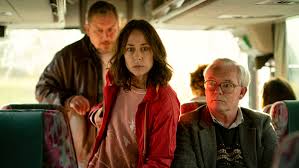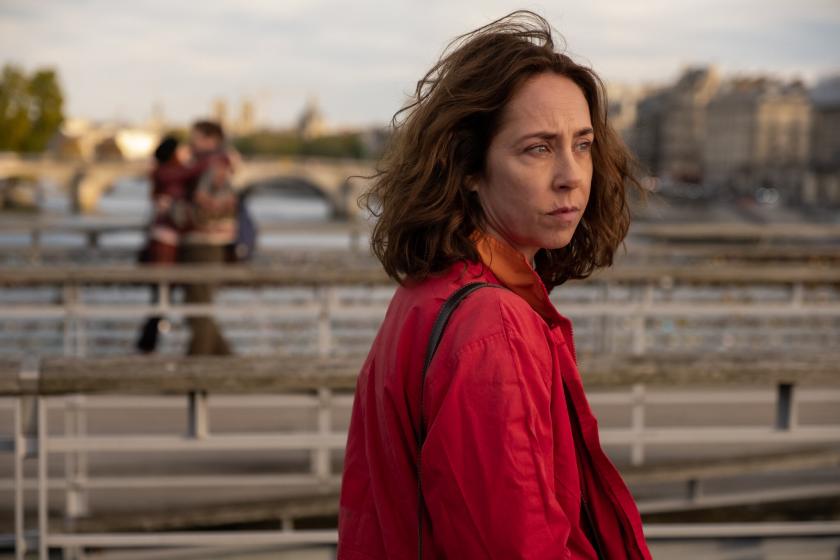Rose has taken a while to get a release in the UK; this Danish comedy-drama opened in Scandinavia back in the autumn of 2022 and won positive reviews in the US last Christmas. Releasing a movie just as the sun finally appears to make spending an evening in a cinema unappealing, seems like a risky choice.
But if you harbour a soft spot for Sofie Gråbøl (main picture), the actress who sparked a worldwide run on Faroe Island sweaters when she starred in The Killing, Rose may well draw you back into the dark. Gråbøl here is playing a very different character; Inger, a middle-aged woman with schizophrenia who lives in a care home.
It's 1997 and Inger’s sister Ellen (Lene Maria Christensen) has recently married the kindly Vagn (Anders W Berthelsen). The couple offer to take Inger along with them on their honeymoon, a cultural coach tour of France. When she was 18, bright, talented Inger went to live in France to learn the language. But something happened on that year abroad that triggered the first manifestation of her disabling psychiatric condition.
Prone to Tourette’s-type outbursts, Inger has become institutionalised over the years, heavily medicated she's convinced her over-protective mother that she can’t walk far and needs to use a wheelchair. When Ellen tells their mother as she waves them off that they'll manage on their holiday without one, the first signs of tension emerge.
What follows is a sweet if slightly too long road movie as the threesome join their fellow Danes on a coach destined for a whistle-stop tour of Paris, Monet’s garden and the D-Day beaches.Their holiday occurs in the weeks just after the death of Princess Diana and there's a squabble about whether the crash sight should be another tour stop. Right from the start the other holiday-makers are wary of Inger’s quirky behaviour and the potential for embarrassment, or worse, looms. Andreas, (Søren Malling, pictured below almost unrecognisable since The Killing) plays an uptight physics teacher. Andreas bullies his own wife and young son, and makes no bones of his disapproval of Inger's outbursts, and the decision by her sister and her brother-in-law to include her on the coach tour.
 Rose is a personal passion project by Niels Arden Oplev, the Danish director of The Girl with the Dragon Tattoo and is based on his own siblings’ experience. Apparently the film took five years to make and its production was fraught with worries about how his family, particularly his schizophrenic sister, would feel about having their lives portrayed on screen. Oplev has balanced sensitivity with humour and his film displays the mixture of love, guilt, impatience and embarrassment that one can feel when a family member is neurodivergent or has a mental illness.
Rose is a personal passion project by Niels Arden Oplev, the Danish director of The Girl with the Dragon Tattoo and is based on his own siblings’ experience. Apparently the film took five years to make and its production was fraught with worries about how his family, particularly his schizophrenic sister, would feel about having their lives portrayed on screen. Oplev has balanced sensitivity with humour and his film displays the mixture of love, guilt, impatience and embarrassment that one can feel when a family member is neurodivergent or has a mental illness.
It’s always tricky when film-makers mine a family-member’s vulnerable, personal life for material. There are questions of exploitation and who benefits most from the exposure on screen. Does even an observant relative truly understand what it's like to live with a disorder like schizophrenia? But Oplev has made a good attempt; Inger is a complex, rounded character whose intelligence and compassion shine through despite her occasionally alarming conduct. There’s a school of films that use people with mental illnesses or intellectual disabilities as props to be included in the plot to turn a dodgy lead character into a nicer person (Rain Man, Peanut Butter Falcon, What’s Eating Gilbert Grape) but Oplev avoids falling into that trap. Andreas, the judgmental physics teacher doesn’t get much more enlightened with his exposure to Inger, and she uses him for one of the neatest jokes in the film. Her sister Ellen is not always completely saintly and is the more credible and likeable for her impatience.
Rose most reminded me of two other excellent films by directors with disabled siblings, Elissa Down who has two autistic brothers, made the wonderful teenage comedy Black Balloon (with an outstanding performance by Toni Colette) and Sandrine Bonnaire’s documentary, Her Name is Sabine, about her own schizophrenic sister showed real skill. There will doubtless be people who argue that Inger should have been played by an actor with schizophrenia, but the strain of taking part in what looks like a complex, not particularly lavishly budgeted production, may have been too much to ask of any actor with significant mental illness. Sofie Gråbøl has based her performance on a close observation of the debilitating physical side effects that come with decades of taking anti-psychotic medication and is very credible as Inger. Rose is not a flashy film and won’t appeal to cynics or those with no experience of neurodivergence, but its heart is in the right place and it's well worth watching.















Add comment